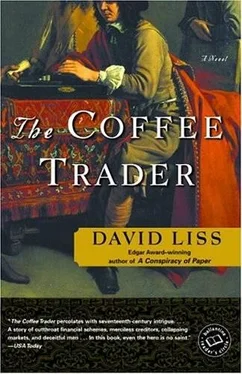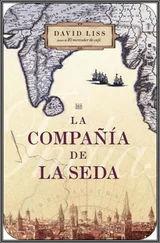“The Company likes to hoard its supplies. I’ll tell you something else: the Turks, you may know, have made it a crime punishable by death for any man to remove a living coffee plant from their empire. They wish no one to grow and sell the fruit but themselves. The world knows what a wily lot they are, but I can tell you they are but lost little lambs compared to the Dutch. A sea captain named van der Brock has managed to smuggle a plant out, and now the Company is beginning its own plantations on Ceylon and Java. It hopes to produce enough to gain leverage with oriental trading partners. But it must have other plans as well.”
Miguel nodded. “Once the crop begins to yield, the Company will want to build a market in Europe.”
“Precisely. I won’t ask you what you are planning, but I think we might make a pact. I’ll be happy to let you know what news I hear of the trade if you will think first of me as your supplier here on the Exchange-provided you don’t mention this to anyone.”
“I consider it a bargain well struck,” Miguel told him.
They slapped their right hands together, formalizing the agreement. Nunes must certainly have felt he would make a little money on this deal and might even hope that his friend’s interest signified a shift in the markets he might exploit.
Miguel could not recall when he last felt such excitement, so even when he heard that the price of brandy had improved at the last minute-and if he had held on to his futures he would have made four or five hundred guilders-he hardly cared. What did such petty sums mean to him? In a year’s time he should be one of the richest men among the Portuguese in Amsterdam.
from
The Factual and Revealing Memoirs of Alonzo Alferonda
After I had been cast out of the community, most of my friends and associates would have nothing more to say to me. Many shunned me because they feared the power of the Ma’amad, others because they were but cattle who could not for a moment imagine I would have been put under the cherem unjustly. And, if I am to be honest as I have promised, there were those who believed I had cheated them or used them ill and were delighted to see no more of Alferonda.
Men who owed me money boldly refused to pay, as though the ruling of the Ma’amad somehow superseded all civic law and personal honor. Old business contacts returned my notes unopened. Parido’s influence left me without a livelihood, and though I had some money saved, I knew it would not last me long.
I cannot say precisely how I fell into lending money at interest. An inquiry here, a promise there, and one morning I awoke and could not longer deny that I had become a moneylender. The Torah speaks ill of usurers, but the Talmud teaches us that a man may bend the Law in order to live, and how else was I to live if those responsible for upholding the Law unjustly took away my livelihood?
There was no shortage of my kind in Amsterdam. We were as specialized as taverns, each of us serving one particular group or another: this lender serves artisans; that one, merchants; yet another, shopkeepers. I resolved never to lend to fellow Jews, for I did not want to travel down that path. I would not want to have to enforce my will on my countrymen and then have them speak of me as one who had turned against them. Instead, I lent to Dutchmen, and not just any Dutchmen. I found myself again and again lending to Dutchmen of the most unsavory variety: thieves and bandits, outlaws and renegades. I would not have chosen so vile a bunch, but a man has to earn his bread, and I had been thrust into this situation against my will.
I knew at once that I would have to be something of a villain if I were to see my money returned, for I lent to those who earned their bread by taking what did not belong to them, and I had no reason to believe my capital would be any more sacrosanct than a traveler’s purse or shopkeeper’s strongbox. The only way to force these men to make good on their promises was to let them fear the consequences of not doing so.
Sadly, Alfonzo Alferonda is not a villain. He cannot find it in his heart to be harsh and cruel and violent to his fellow man, but what he lacks in cruelty he compensates for in guile.
I let it be known, therefore, that I was not a man with whom to trifle. When the body of a nameless mendicant was found floating in a canal, it was no hard thing to circulate a story that there floats a fool who thought he could avoid paying Alferonda. When an impoverished fellow broke his arm or lost an eye in some unfortunate accident, a few coins in his hand easily persuaded him to tell the world that he wished he had paid Alferonda in a timely fashion.
Though I believe the Holy One, blessed be He, has granted me a warm face, one full of kindness, it was not long before the thieves of Amsterdam trembled at my countenance. A scowl or a raised eyebrow was enough to make the gold flow.
When I confronted a debtor who truly could not pay me, I made him believe that here, for the first time in his life, Alferonda had decided to show a measure of mercy, a mercy so tentative and fragile that even to think of abusing it would be the greatest madness in the world. This thief would pay me before he would put food into his own mouth.
These small deceptions fooled my audience easily. Thieves are, by nature, simple and easily duped, inclined to believe in monsters and ogres. Some, when they paid me, even believed I knew the contents of their purses, the locations of their paltry stashes, as though I were more witch than moneylender. I did nothing to make them believe otherwise. Alferonda is no fool.
I knew my name was spoken in the most unflattering terms among my fellow Jews in the Vlooyenburg, but I also knew I was blameless in the sight of the Lord-at least, as blameless as a man who lends money to thieves can ever hope to be.
Miguel met Geertruid in the Three Dirty Dogs, a tavern near the docks where great ships lay at anchor, packed with goods desired the world over. The day was warm and uncharacteristically sunny, and Miguel paused to look at the ships glimmering in the light reflecting off the harbor. Some of the vessels were great monsters from ports around the world, ships whose captains knelt in prayer while their pilots maneuvered the treacherous waters of the Amsterdam port. These giants were awesome to behold, but not nearly so awesome to Dutch eyes as the smaller vliebooten -flyboats-sleek little vessels that were handled with far more agility by a smaller crew and yet held more cargo than the massive ships of other nations. Thanks in part to these maritime miracles, the Dutch now stood supreme not only in trade but in transport, for who would not want his goods shipped in Dutch bottoms when such conveyances reduced costs by as much as a third?
The Three Dirty Dogs was infrequently visited by Jews-its patronage consisted of warehouse workers and owners-and Miguel knew that any man of the Nation who saw him there would have his own secrets to keep. It had become a regular habitation for Geertruid, whose husband had been part owner of one of those great buildings along the Brouwersgracht.
The windows of the tavern had been placed strangely toward the ceiling, and bright sharp-angled shafts of sunlight crisscrossed the dusky interior. Most of the tables were occupied, but the space was not crowded; groups of men sat in small clusters. Near the door someone read a news sheet aloud in a booming voice while a dozen men listened and drank.
Geertruid sat at the back, dressed in gray skirts and a blue bodice, modest and nondescript. She did not go to the tavern to make merry today but to do business, and she wore no bright colors with which to attract attention. She puffed at a pipe and sat in close quarters with her man, Hendrick, who whispered something conspiratorial when he saw Miguel.
Читать дальше












